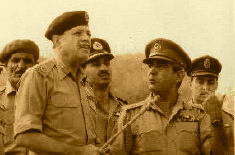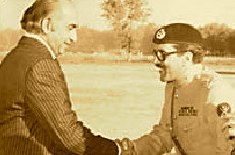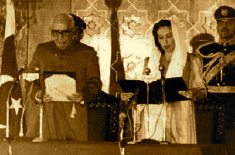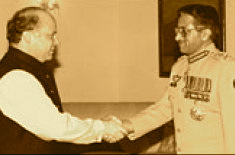One of things that I’ve often said in my writings (and otherwise) about Pakistan’s sometimes messy and often uninspiring politics is that it is one dominated by personalities rather than issues. In Pakistan, personalities, in the absence of checks and balances, have often become bigger than institutions with the result that we have failed; in the 60 year old history of our country; in creating institutions, political or otherwise. This alone has caused immeasurable damage to the country over time.
With recent talk of a deal between Benazir Bhutto and Musharraf in the air, a childhood friend of mine who is a die-hard Peoples Party loyal remarked: “ab tu saray hi aik jaisay hain” (now all of them are the same!). Political analysts have also predicted doom and gloom for PPP should Benazir go ahead with the deal. These got me thinking about what are the tell-tale signs of a leader’s lack of sincerity and imminent downfall?
In other words, what are some of the signs that should tell you that it is time to ditch your favorite politician? Switch your political party? or demand a change in your party’s political leadership? If our politicians can switch their loyalties, why can’t we?
Drawing upon our rich and colorful political history, what criteria can we apply to make that decision? Based on my own limited reading of Pakistan’s history – through the Understanding Pakistan Project – here are the Seven Habits of Highly Dispensable (Political) Leaders:
1. The leader acts as if he or she is bigger than institutions: This is one of the most long-held positions of Pakistan’s highly dispensable politicians. It is now so ingrained in our political psyche that Pakistan is left with no real (political) institutions today. The Election Commission, The Ehtesaab Bureau, or The Supreme Court of Pakistan. We’ve seen it all and they’ve done it to all.
2. The leader tells you; and probably believes in it too; that only he or she can save the country: This is one of the most favorite positions of Pakistan’s highly dispensable politicians. Somehow the country is full of many saviors and yet the situation has, over the years, only managed to deteriorate for all of us. There are rare circumstances when this may be true and when that happens it is quite self-evident and the leader hardly has to tell you that. So, for all practical purposes when your politician tells you that only he or she can save the country, you can be pretty sure that he is as dispensable as a cup of styro-foam.
3. The leader tells you that only he or she knows what is right for you and your country: Arrogance is perhaps the most common habit of a politician gone bad–not only in Pakistan but also elsewhere (remember Bush’s “you’re with us or against us?”) The most humbling and beautiful moment of a true democracy is when a politician stands corrected and reminded, sometimes in quite a brutal manner, of the “wisdom of the crowd”. When your politician tells you that only he or she knows what is right for you and your country, its time to press the eject button under his or her seat.
4. The leader is chosen for his or her loyalty rather than independence, integrity, or competence: More often than not during Pakistan’s sixty year old history, leaders have chosen their successors for their loyalty rather than independence, independence, and competence. Khawaja Nazimuddin, General Mohammad Musa, Ziaul Haq, or even Musharraf, you name it. Many of these decisions have backfired and have caused serious repercussions for the country. When these decisions are made, something goes quite wrong with the system. You get the picture.
5. The leader makes a “temporary” compromise on a fundamental principle that defines him or her: This is another favorite one of mine. Pakistani leaders are often associated with certain “principles” that define them. Pakistan Peoples Party stands for democracy and struggle against military rule in Pakistan. Tehrik-e-Insaaf stands for justice and constitutionalism. General Musharraf, when he came to power, promised broad-based political reforms. When these principles are compromised the leader doesn’t remain the same leader any more. When a leader compromises on a fundamental principle, it is a surest sign that he or she deserves to be shown the door.
6. The leader owes his or her legitimacy to somebody else but your vote: This is a tricky one because it is often hard to tell. As far as this one is concerned our political leaders quite often say just the right things. However, the voters need to ask themselves a question: Does this person need the goodwill of anybody else except the electorate to stay in power? Whether it is the Army or America, when the answer to the above question is in the positive one can rest assured that Pakistan’s interests and those of its people will take the second seat. So should they in our hearts and minds…
7. The leader thrives by creating a vacuum of leadership around him: This is a deep one and has many manifestations. Many a times, the leader actively creates a political around him to make himself dispensable. In other situations, you would find him surrounding him or herself with utterly incapable people (think: Law Minister Wasi Zafar, for instance) who not only provide him bad advice but also insulate him from the reality. He or she becomes inaccessible to the masses. By the same token, he should also lose the consent of the masses.
Most Pakistani politicians – and I challenge you on that one – have shown one or more these traits just prior to their downfall and some even throughout their political careers. When you see a large number or all of these traits working at the same time, you almost know that a perfect political storm is just round the corner and that the days of that individual are numbered. The “political bug” has not spared even a single soul in public office. Both genders are equally susceptible.
In a sense the above list forms a series of tests, a checklist, so to speak that one can tick-off for every politician to see how close he or she is to his ultimate demise and/or how badly infected he or she is with the political bug. It is also a tool to use while reading the political statements of our worthy politicians Can the readers think of any other generalizable character trait, sign, or habit that our political leaders have demonstrated repeatedly as they have fallen from grace? How would Ayub Khan, Zulfiqar Ali Bhutto, Zia-ul-Haq, Benazir Bhutto, Nawaz Sharif, and Pervez Musharraf fare on each of these seven tests?
I leave that judgment to you all…
Dr. Athar Osama is a public policy analyst and amateur historian of Pakistan’s political and constitutional history. He is also the founder of The Understanding Pakistan Project. An earlier version of this article was published at Dawn.com.























































Two thoughts cross my mind …
Firstly, I am amused by our supposed “loyalty” to a political party. May be I am a nutcase, but I do not suffer from this condition in the least. I wonder how I can “change” something that I never had in the first place; neither do I believe that any of our politicians ever did. “Loyalty” is too grand a term to be attributed to their selfish, idiotic, shenanigans.
Secondly, is the sense of self importance and grandeur that we suggest afflicts our politicians; how immune are we, as ordinary Pakistanis, to such delusions ourselves? Why should our politicians be any different from us? Ah … now please don’t any one tell me that they are utterly selfless when it comes to Pakistan and would give anything, everything, including life, for its sake.
Reading the comments in here and the personal whims of the posters, all such claims are simply pure b.s.
wowwww,wonderful pictures, Thanks for posting them, look, pay attention and see how the time changes, Zia is acting like a complete ‘Chaplose’ and ‘Chamcha’ and Musharraf is acting like he is in control even at that time …. Nawaz even look like embarassed in the picture … ‘ohhhh what did i do, why did i give you that position’ …. hahaha
Owais
Zia always came across as a humble person in one-to-one meetings. It was his actions that showed that he was quite the opposite.
Athar, brilliant assessment. I am a very a-political person but from what I have been able to see since I returned to Pakistan in 1993 is that most of our political parties are led by individuals who suffer from most of the ailments you mention:
1. They consider themselves bigger than their institutions
2. They believe – or at least that is what they claim – that only they can save the country
3. Only they know what is right for their parties and for the country
4. They make “temporary” compromises for their own personal interest
5. They try to maintain a vacuum of leadership so that the party is identified with them – and no-one else.
Is it their egos that are responsible for their downfall? I think all the habits you have rightly defined, suggest egoistic tendencies.
The Zia-Bhutto photo on top right of this post is a ‘picture worth thousand words’. I also want to draw everybody’s attention to Zia’s face expression as well as his bending forward in respect (read as ‘chaploosi’) body language in the photo